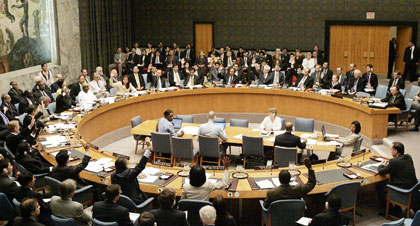|
UN adopts resolution to end Lebanon war
(Reuters)
Updated: 2006-08-12 08:33
UNITED NATIONS -- The U.N Security Council unanimously
adopted a resolution on Friday calling for an end to the month-old war between
Israel and Hizbollah, but the Jewish state said its offensive in Lebanon would
not be halted yet.
The vote in New York capped weeks of anguished negotiations on a plan to
halt the war, triggered on July 12 when Hizbollah guerrillas captured two
Israeli soldiers in a cross-border raid.

Members of the U.N.
Security Council vote at the United Nations in New York on a resolution
calling for an end to the conflict in Lebanon August 11, 2006. The U.N.
Security Council adopted unanimously on Friday a resolution calling for an
end to fighting between Israel and Lebanon's Hizbollah and authorizing up
to 15,000 new peacekeepers to enforce it.
[Reuters] |
The
resolution, negotiated by the United States and France, authorised up to 15,000
U.N. troops to be deployed to monitor a withdrawal of Israeli troops from
southern Lebanon and to help the Lebanese army enforce a ceasefire.
The
Lebanese government accepted the resolution and would issue a formal acceptance
to the 15-nation Security Council on Saturday, an official source said.
Israeli Prime Minister Ehud Olmert told U.S. President George W. Bush he
backed the resolution, an Israeli government official said.
"The prime
minister spoke with President Bush and thanked him for his assistance in keeping
Israeli interests in mind at the Security Council," the official said. Olmert
will urge his cabinet to approve the U.N. resolution at a meeting on Sunday.
An Israeli official said before the vote, however, the Israeli army
would not stop its offensive in Lebanon until the cabinet met on Sunday to
consider the resolution.
Earlier, Olmert ordered an expansion in the ground
offensive against Hizbollah, which has strongholds in southern Lebanon.
Israeli attacks killed 26 people in Lebanon on Friday, seven of them
when a drone fired rockets at a convoy of hundreds of cars fleeing the south. An
Israeli soldier was killed in fighting and Hizbollah rockets wounded seven
people in Israel.
At least 1,041 people in Lebanon and 124 Israelis have
been killed in the month-old war.
The U.N. resolution called for a "full
cessation of hostilities". Hizbollah should stop all attacks immediately and
Israel should end "all offensive operations", it said.
After fighting
stops, Israel must withdraw all its forces from southern Lebanon at the earliest
opportunity, said the resolution. Lebanon is due to deploy its armed forces
throughout southern Lebanon as Israel withdraws.
ANNAN ROLE
U.N. Secretary-General Kofi Annan said he would help the
parties over the weekend to establish a timetable for a truce.
He
chastised the Security Council for not acting sooner when civilians on both
sides "have suffered such terrible, unnecessary pain and loss".
"All
members of this council must be aware that this inability to act sooner has
badly shaken the world's faith in its authority and integrity," Annan said in an
address. "War is not politics by other means."
U.S. Secretary of State
Condoleezza Rice cautioned no one could expect the resolution to end all
violence, saying: "The conditions of a lasting peace must be nurtured over
time."
British Prime Minister Tony Blair welcomed the resolution and
said he planned to visit the Middle East soon to search for ways to bring peace
between Israelis and Palestinians.
"We must work to address the
underlying root causes of this conflict," Blair said in a statement. "We must
never lose sight of the fact that the conflict in Lebanon arose out of the
desire to exploit the continuing impasse in Palestine."
At the
insistence of Lebanon, a reference was dropped from the resolution's final text
to Chapter 7 of the U.N. Charter that permits a robust U.N. peacekeeping
operation.
But the text still carried strong rules of engagement for the
U.N. force that France was expected to lead.
Israeli raids on a bridge
near the border with Syria killed 12 people and wounded 18, hospital staff said.
Witnesses said a second strike hit the bridge 15 minutes after the first had
brought rescuers rushing to the scene.
Israeli bombs also hit
electricity transformers and cut off power to the southern city of Tyre,
security sources said.
Hizbollah announced the death of four more of its
fighters.
More bombs hit Beirut's battered Shi'ite Muslim suburbs, hours
after dawn raids on the capital. Many people fled the suburbs on Thursday after
Israel dropped warning leaflets.
Hizbollah fired more than 55 rockets
into Israel, wounding seven people, Israeli police and ambulance staff said.
Humanitarian agencies sought ways to get aid to an estimated 100,000
people trapped in southern Lebanon and the mayor of Tyre said the city could run
out of food in two days.
Aid convoys have been unable to deliver
supplies since an Israeli air strike hit a bridge on the Litani River on Monday.
|
| |
|
| |
|
|
|
| Most Commented/Read Stories in 48 Hours |
|
|
|
|